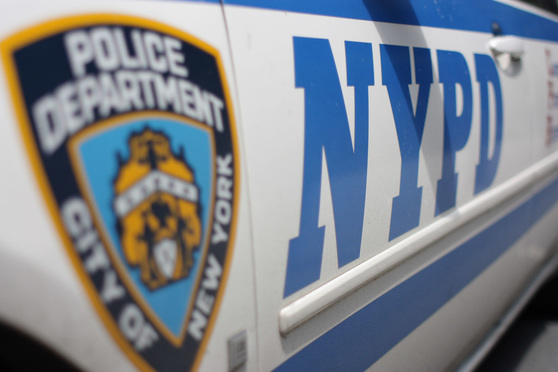NYPD Rescinds Police-as-Prosecutors Agreement With Manhattan DA
The New York City Police Department has backed out of a two-year arrangement with the Manhattan District Attorney's Office in which department legal staff appeared as the prosecution in certain low-level cases.
March 12, 2018 at 06:07 PM
5 minute read
 New York police car NYPD logo. Photo Credit: flickr
New York police car NYPD logo. Photo Credit: flickr The New York City Police Department has backed out of a two-year arrangement with the Manhattan District Attorney's Office in which department legal staff appeared as the prosecution in certain low-level cases.
The practice of using police staffers as prosecutors in Summons Court had drawn criticism from activists, elected officials and members of the legal community, but Lawrence Byrne, the NYPD's deputy commissioner for legal matters, said that preparing for trials and appeals was taxing the NYPD Legal Bureau's resources.
“I don't have the lawyer time, frankly, to do that,” Byrne said.
In the two years since the memorandum was signed, NYPD legal staff appeared in 38 cases, of which 13 were in Criminal Court and 25 were summons cases on appeal.
The NYPD Legal Bureau employs some 100 lawyers, Byrne said, who are tasked with assisting the department in various legal matters, including handling the roughly 2,000 lawsuits the department receives each year.
With respect to the Legal Bureau's work in the Summons Courts, Byrne said NYPD legal staffers will focus on getting police officers prepared to appear in court.
The NYPD and the Manhattan DA Cyrus Vance Jr.'s office signed a memorandum of understanding in February 2016 in which the DA delegated the authority to prosecute cases in the summons part of Manhattan Criminal Court to the department.
It is generally rare for Vance's office to send prosecutors to Summons Court, but there have been exceptions, such as cases involving hundreds of protesters arrested in 2011 during Occupy Wall Street demonstrations.
Prior to the signing of the memorandum of understanding, Byrne told the New York Daily News that using NYPD legal staff in summons cases could help the department avoid civil liability in some cases.
“We're not going to settle frivolous lawsuits any more. We're going to fight lawsuits. We're going to take them to trial. We're going to defend them,” Byrne told the Daily News.
Among the first defendants that the NYPD prosecuted after the memorandum was signed were Arminta Jeffryes and Cristina Winsor, who were taking part in Black Lives Matter protests in March 2016 in Manhattan.
Jeffryes was cited for crossing a street against a “don't walk” signal and Winsor was among a group of protesters who police say stepped off of a usable sidewalk and walked in a roadway despite orders from police officers not to do so.
In September 2016, while Jeffryes and Winsor were fighting their summons cases, Manhattan Criminal Court Judge Guy Mitchell found that the memorandum did not create a conflict of interest.
Jeffryes and Winsor also filed a civil suit against Vance's office and, in September 2017, Manhattan Supreme Court Justice Lucy Billings denied motions to dismiss by the NYPD and the Manhattan DA's Office, finding that the arrangement could create a conflict of interest that violates the protesters' due process rights and undermines the reliability of the adversarial process.
In December, the New York City Bar Association's criminal justice operations committee issued
a report stating that the practice raises ethical and legal issues and called for it to end.
The committee said that, while there appears to be few legal restrictions on district attorneys delegating their powers, past rulings by the Court of Appeals call into question the legality of delegating that authority for the purpose of avoiding civil liability.
In 1989, the state's high court found in Cowles v. Brownell, 73 N.Y.2d 382, that an arrangement between a plaintiff suing a municipality and two police officers for false arrest in which the plaintiff would agree to drop his civil claims in exchange for a criminal harassment charge getting thrown out was not enforceable.
But Byrne said that at least one court has found in favor of the NYPD and the Manhattan DA on the issue.
“I think their arguments have no basis,” Byrne said.
On March 6, a group of eight local and state elected officials from Manhattan sent a letter to Vance's office arguing that, while state law does allow district attorneys to delegate their prosecutorial powers, they are not allowed to choose their replacements.
“A district attorney ought to consider the merits of each case, in particular, the actions of law enforcement officers, and only prosecute cases in the public interest,” the letter stated. “By delegating responsibility for prosecutions to the NYPD, you have also removed this check on their power.”
Byrne sent a letter to the Manhattan DA's Office dated March 7 stating that the department is rescinding the memorandum of understanding.
On March 9, Joan Vollero, the Manhattan DA's senior adviser for intergovernmental affairs and public policy, responded in a letter to the elected officials that it's the DA's position that summons cases “are best handled by a judge or judicial hearing officer, so that limited prosecutorial resources are not expended on minor offenses.”
A spokesman for the Manhattan DA's Office declined to comment further.
National Lawyers Guild attorneys Gideon Oliver, Martin Stolar, Jonathan Wallace, Elena Cohen and Michael Decker appeared for Jeffryes and Winsor in their criminal and civil proceedings. Oliver said in an email that the rescission of the policy is a “complete victory” for Jeffryes and Winsor, and that their cases would have ended years ago with adjournments in contemplation of dismissal had the NYPD not used legal staff to prosecute the cases.
This content has been archived. It is available through our partners, LexisNexis® and Bloomberg Law.
To view this content, please continue to their sites.
Not a Lexis Subscriber?
Subscribe Now
Not a Bloomberg Law Subscriber?
Subscribe Now
NOT FOR REPRINT
© 2025 ALM Global, LLC, All Rights Reserved. Request academic re-use from www.copyright.com. All other uses, submit a request to [email protected]. For more information visit Asset & Logo Licensing.
You Might Like
View All
Five Years After Vega Much Remains Unsettled in Pay Frequency Litigation

Spotify GC Steps Down, Opts to 'Step Away From Full-Time Corporate Life'
2 minute read
Dechert Sues Former Attorney For Not Returning Compensation

Trending Stories
- 1In Novel Oil and Gas Feud, 5th Circuit Gives Choice of Arbitration Venue
- 2Jury Seated in Glynn County Trial of Ex-Prosecutor Accused of Shielding Ahmaud Arbery's Killers
- 3Ex-Archegos CFO Gets 8-Year Prison Sentence for Fraud Scheme
- 4Judges Split Over Whether Indigent Prisoners Bringing Suit Must Each Pay Filing Fee
- 5Law Firms Report Wide Growth, Successful Billing Rate Increases and Less Merger Interest
Who Got The Work
J. Brugh Lower of Gibbons has entered an appearance for industrial equipment supplier Devco Corporation in a pending trademark infringement lawsuit. The suit, accusing the defendant of selling knock-off Graco products, was filed Dec. 18 in New Jersey District Court by Rivkin Radler on behalf of Graco Inc. and Graco Minnesota. The case, assigned to U.S. District Judge Zahid N. Quraishi, is 3:24-cv-11294, Graco Inc. et al v. Devco Corporation.
Who Got The Work
Rebecca Maller-Stein and Kent A. Yalowitz of Arnold & Porter Kaye Scholer have entered their appearances for Hanaco Venture Capital and its executives, Lior Prosor and David Frankel, in a pending securities lawsuit. The action, filed on Dec. 24 in New York Southern District Court by Zell, Aron & Co. on behalf of Goldeneye Advisors, accuses the defendants of negligently and fraudulently managing the plaintiff's $1 million investment. The case, assigned to U.S. District Judge Vernon S. Broderick, is 1:24-cv-09918, Goldeneye Advisors, LLC v. Hanaco Venture Capital, Ltd. et al.
Who Got The Work
Attorneys from A&O Shearman has stepped in as defense counsel for Toronto-Dominion Bank and other defendants in a pending securities class action. The suit, filed Dec. 11 in New York Southern District Court by Bleichmar Fonti & Auld, accuses the defendants of concealing the bank's 'pervasive' deficiencies in regards to its compliance with the Bank Secrecy Act and the quality of its anti-money laundering controls. The case, assigned to U.S. District Judge Arun Subramanian, is 1:24-cv-09445, Gonzalez v. The Toronto-Dominion Bank et al.
Who Got The Work
Crown Castle International, a Pennsylvania company providing shared communications infrastructure, has turned to Luke D. Wolf of Gordon Rees Scully Mansukhani to fend off a pending breach-of-contract lawsuit. The court action, filed Nov. 25 in Michigan Eastern District Court by Hooper Hathaway PC on behalf of The Town Residences LLC, accuses Crown Castle of failing to transfer approximately $30,000 in utility payments from T-Mobile in breach of a roof-top lease and assignment agreement. The case, assigned to U.S. District Judge Susan K. Declercq, is 2:24-cv-13131, The Town Residences LLC v. T-Mobile US, Inc. et al.
Who Got The Work
Wilfred P. Coronato and Daniel M. Schwartz of McCarter & English have stepped in as defense counsel to Electrolux Home Products Inc. in a pending product liability lawsuit. The court action, filed Nov. 26 in New York Eastern District Court by Poulos Lopiccolo PC and Nagel Rice LLP on behalf of David Stern, alleges that the defendant's refrigerators’ drawers and shelving repeatedly break and fall apart within months after purchase. The case, assigned to U.S. District Judge Joan M. Azrack, is 2:24-cv-08204, Stern v. Electrolux Home Products, Inc.
Featured Firms
Law Offices of Gary Martin Hays & Associates, P.C.
(470) 294-1674
Law Offices of Mark E. Salomone
(857) 444-6468
Smith & Hassler
(713) 739-1250






